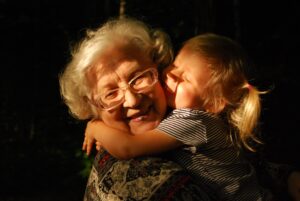How To Heal With Your Inner Child Work
Do you know what inner child work is?
Are you interested in healing and growing from your past?
Do you want to learn more about how your childhood affects you?
How Am I Affected by My Childhood?
As each of us grows up, we are like sponges, absorbing what is around us. We are affected by the adults, peers, and environments we experience. You may not feel like your childhood affects you in your adult life experience, but there is a possibility that it actually does.
Attachment styles
According to Ross Thompson of the University of California, the relationship between caregivers and infants is vital to development. This relationship helps determine what type of attachment style people develop growing up.
In our recent article, “How To Have Better Communication In A Relationship,” we discuss attachment issues. The APA Dictionary describes attachment styles as how people relate to others. These attachment types affect how people act in their relationships.
Types of Attachment Styles
In a study by Sessa et. al, the researchers wondered how secure, anxious, and avoidant attachment affect relationships.
- Secure attachment style: Securely attached people feel a strong sense of self. This strong sense of self is helpful in conflict. People with this attachment style are not afraid of expressing their emotions because it has usually been well-received by others.
- Anxious attachment style: People who have this attachment style struggle with self-doubt and self-esteem. Anxiously attached people often worry about what others will think.
- Avoidant attachment style: People who have this attachment style push other people away and detach themselves. Many times growing up, this person may have had their feelings not taken seriously or ignored by others.
Additionally, Sessa et. al found that anxiously attached people are more likely to try and appease people when they share their emotions, not wanting to upset the other person. Avoidantly attached people were more likely to be blunt with their approach, not sugar-coating it like the former.
There is another attachment style called disorganized attachment that is equally important. According to Mariana Bockarova Ph.D., this attachment style is thought to be a result of childhood trauma. Bockarova states that people with this attachment style desire to be loved but fear it at the same time. The caregivers failed at loving and protecting the child. As a result, when this child tries to love and trust in someone new their attempts are associated with the fear or abuse they endured from their past.
Abuse and Neglect
Devastatingly, the Foundation for Youth from 2019, reports that there are “656,000 (rounded) victims of child abuse and neglect” in the United Sates. The data states that children who are in their first year of life, are girls, and are American-Indian or Alaska Native face the highest risk factors for abuse.
According to the Child Welfare Information Gate, Abuse comes in many forms. Children can face neglect or physical, sexual, or emotional abuse. As mentioned before, children are like sponges. The treatment they receive as they grow affects them greatly. The results of this treatment follow them into their adult life.
If you faced any abuse or neglect, know that you deserve support. You did not deserve any of the treatment you received, and you are truly resilient.
What is Inner Child Work?
Inner child work is all about comforting the child you once were. If you experienced trauma or abuse as a child, it has probably affected you in your adult life. Inner child work focuses on healing from the pain of the past. The child who was once scared, alone, forgotten, or hurt can now be seen and embraced.
In reality, there will be times when you look back on your childhood and are disappointed. If you feel pain from the past, know that you deserve to heal and grow.
Why is Inner Child Work Important?
Inner child work is very important. Correspondingly, Sjöblom et. al states that your inner child will affect you and your well-being throughout life. In that study, the data shows that people’s inner child can majorly affect their lives. For example, the inner child can influence things like how someone treats or views future generations.
Intergenerational Trauma
Speaking of future generations, intergenerational trauma affects many families. This type of trauma is passed down from generation to generation. Many times, a child experiences hardship or abuse that is harmful to them. Unfortunately, this trauma often goes untreated. As a result, when it is time for this person to become a parent, the unresolved trauma follows them and is passed onto their children.
According to Lovie Jackson Foster, PhD, MSW in this Social Work Today article, many generations of people have not dealt with their trauma or received any help for it. You may notice this in your own family. Many older people in your family may be against therapy or receiving any type of mental health aid.
Break the Family Cycle
On her website, Dr. June Cao talks about how many Asian-Americans view therapy. Cao states that, “Asian Americans’ family values, their unique culture, and stigma towards mental health may get in the way of seeking psychotherapy.”
Moreover, many Asian-Americans grew up with the idea that treating mental health issues is embarrassing, admits weakness, or should be dealt with only within the family setting . Many older generations in other cultures feel this way too.
It is important to get help for any trauma you face. Intergenerational trauma shows that the things we don’t deal with now can affect our future kids and grandkids.
Living a Happier Life
Healing your inner child is not only important for the future generations, it is important for yourself! You deserve to heal from the past! The inner child inside of you deserves to be shown the love and care it did not receive when it was younger.
How to Start Healing Your Inner Child
First, Reflect on Your Childhood
Put yourself in the mindset of your inner child. Ask yourself these questions:
Self-Evaluation
- What causes me pain?
- How do my parents/caregivers treat me?
- Do I get along with my peers?
- When I am upset, who comforts me? Does anyone comfort me at all?
- Are my voice and opinions heard?
- Am I scared or unsettled in my surroundings?
Reflect on your responses to these questions. You can even use these questions as journal prompts to explore your emotions through writing. If you feel like there is unresolved feelings or pain from the past, don’t ignore it. Ignoring the pain may feel like the option that is more comfortable, but it can cause more damage down the road. Dealing with past trauma can be very difficult and emotional. You are very strong to be doing the work necessary to heal and move forward in your life.
Second, Consider Inner Child Therapy
Speaking with a mental health professional or therapist helps many people deal with trauma. With the help of a professional, you can revisit the past and cope with the hardships you experienced.
Healing your inner child can be hard work! You don’t have to face this work alone. You deserve to voice your concerns in a supportive environment with someone who cares. This will help lead you to healing and finding inner peace.
Third, Do Things that Make Your Inner Child Smile
Many times, people who experience trauma are forced to grow up fast and mature quicker than their peers. Some children are sadly to busy living in fear to actually play games and be a kid. As an adult, you make the rules of your life now. You are able to do the things your younger self always dreamed of.
Engage in activities that make your inner child happy like:
- Blast your favorite music
- Start a fun collection
- Pick up a new hobby
- Dress in clothes that fit your unique style
- Get artistic – paint, draw, write, or design
- Let loose – dance to a fun song and don’t care what you look like while doing so
- Watch a movie or show you have always wanted to see
Whatever you decide to do, keep you inner child in mind. Think of and appreciate the dreams and aspirations this kid had. Try to live each day doing at least one thing that would make your inner child smile.
Fourth, Practice Self-Care
The work of healing your inner child is physically and emotionally draining. Make sure you are taking care of yourself in these times. Use this checklist to ensure you are keeping up with each of your needs:
Mental and Emotional Wellness
- Make sure you are showing yourself compassion and forgiveness each step of the way
- Speak kindly to yourself
- Practice positive affirmations
- Try to pause and stop yourself when negative thoughts appear in your mind
- Encourage your inner child and tell them how proud you are of them
- Practice Gratitude: In this challenging process, it can be easy to fall into a negative outlook on the world. Try and show gratitude for the things in your life, even if they seem small. These things can be simple like having the ability to wake up each morning or having a body that carries you throughout life.
- Practice mindfulness techniques
Physical Wellness
- Get enough sleep and rest when you feel drained
- Nurture your body with nutritious food and water
- Get your body moving: walk, stretch, dance, swim, etc.
Fifth, Become the Adult You Always Needed
As mentioned before, you may not have received the care or love you wanted in your childhood. Now that you are older, you have a chance to become the adult you always needed. You can do this by:
- Comforting yourself when you feel down
- Validating your emotions and sitting with your thoughts
- Treating yourself with love through self-care practices (as mentioned before)
- Setting boundaries with others and honoring your comfort levels
- Exploring your interests
- Receiving therapy for past trauma and breaking the intergenerational cycle of abuse
You can make a list of all the attributes your inner child would have liked to have in an adult figure. Each day, work on implementing those characteristics in yourself and your life.
Remember that…
You are strong and deserve the happiness and inner peace you are fighting for! Your inner child is so proud of your resilience and courage. You make progress for this child every day!
Mind Connections wishes you the best of luck on your journey with inner child work. We want to help support you! Mind Connections offers therapy for people who face PTSD or any trauma in their life. We also have therapy for feelings of depression, anxiety, and anger. These emotions may come up during your inner child work and deserve to be taken care of!
Also, if you are dealing with intergenerational trauma in your family, we can help. We specialize in helping Asian-Americans. Our therapists understand and advocate for this community, always!
Content Creator, Victoria Gallo; Reviewed by Dr. June Cao







